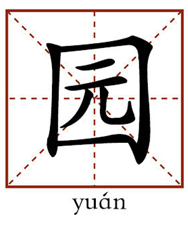Gardens

Yuan usually refers to an area of land used to grow plants or for public recreation activities, such as a garden or a park. In ancient China, Yuan also referred to the royal mausoleum. Inspired by the ancient Chinese landscape paintings, the classical gardens of China are built to be fine and elegant with numerous natural elements.
梨园
líyuán
Li refers to “pear” while yuan means “garden.” This term, although taken literally to mean a pear garden, now symbolizes the operatic circles or the world of theatre.
This term was originally the name of a college of dramatists founded by imperial decree in the Tang Dynasty. According to the New Book of Tang, a work of official history covering the Tang Dynasty, Emperor Xuanzong of the Tang Dynasty (685-762 BCE), who had a good command of music and melody, used to teach music and instrumental performance to 300 palace musicians and hundreds of palace maids in a place called Liyuan in Chang’an. Therefore, the people under the instruction of Emperor Xuanzong of Tang are called the students of liyuan of the Emperor. Now liyuan is used to indicate the theatre circles, and the operatic actors or theatrical performers are usually called liyuan zidi.
漆园吏
qīyuán lì
Qi means “lacquer” while yuan means “yard or garden” and li “minor official or superintendent.” This term, taken literally, means a superintendent in a lacquer-yard. It refers to Zhuangzi (369-298 BCE), an influential Chinese philosopher who is credited with writing one of the foundational texts of Taoism in the Warring States Period.
As it goes in the Records of the Historian by Sima Qian (145 BCE-?), Zhuangzi used to serve as a watchman in a lacquer-yard in the reign of Meng in the state of Song (now somewhere near Shangqiu, Henan Province) during the Warring States Period.
Since Zhuangzi was indifferent to worldly troubles and spent his whole life seeking spiritual freedom, qiyuan li is often quoted to describe someone who is carefree and reluctant to be involved in official duties.
(edited by REN GUANHONG)
